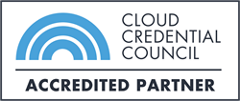category
Cloud Technology Associate

Type
Virtual
Classroom ILT
Skill Level
Available dates
Learning Path
Virtual
Duration
1 Day

TYPE
Virtual
Classroom ILT
LEARNING PATH
SKILL LEVEL
DURATION
AVAILABLE DATES
Choose date
R6 300,00
Price excluding VAT
Introduction
The CCC Cloud Technology Associate™ certification demonstrates that students have the basic skill set and knowledge associated with cloud and virtualization. This certification is a critical step to advance students career as organizations look for qualified Cloud Technology Associates.
The certification allows IT professionals to operate effectively in a cloud environment as they can demonstrate an understanding of the cloud key concepts and its relevant terminology. Furthermore, it provides the foundation needed to successfully complete subsequent vendor-specific training/certification programs and provides a baseline for the subsequent CCC Professional level certifications.
Audience profile
This course is intended for:
- CXO’s, Board Members, & Business Operation Heads
- Database Administrators
- Developers
- IT Analysts
- IT Architects
- IT Managers
- IT Provisioning and Maintenance (Hardware, Network, Storage, etc.)
- Project Managers
- System Administrators
- Technology Enthusiasts & Entrepreneurs
- Testers
- Others (Audit, Purchase etc.)
Pre-requisites
Before attending this course, students must have:
- A minimum of 6 months’ experience in Internet/Web Technologies
- Some basic knowledge of storage, servers and network technologies
Course objectives
After completing this course, students will be able to:
- Overcome the challenges and concerns associated with traditional computing by moving to the Cloud environment
- Describe the evolution of Cloud computing
- Explain the NIST definition of Cloud computing, including its essential characteristics, service models, and deployment models
- Define NIST’s Cloud taxonomy and the reference architecture
- List various benefits and challenges associated with Cloud computing
- Define common terminologies used in Cloud computing
- Define virtualization and explain the fundamental concepts
- Relate virtualization and cloud computing
- Discuss the benefits, challenges, risks, and suitability of virtualization to organizations
- Describe the role and types of hypervisors and containers in virtualization
- Identify the leading manufacturers of hypervisors, containers as well as container orchestration systems
- Explain the terminologies / features associated with virtualization
- Explain the different types of virtualizations
- Relate cloud computing with emerging and enabling digital transformation technologies, such as:
- Big Data Analytics
- DevOps, Serverless Computing
- Artificial Intelligence (AI), Machine Learning (ML), Robotics, Drones, and Cognitive Computing
- Internet of Things (IoT), Edge and Fog Computing
- Blockchain
- Immersive Technologies – Augmented Reality (AR) / Virtual Reality (VR)
- 5G
- Digital Twin
- Robotic Process Automation (RPA)
- Quantum Computing
- Additive Manufacturing (3D Printing)
- Define IT Security, Governance, Risk and Compliance (GRC).
- Understand risk terminologies, top cloud risks and the NIST Cybersecurity Framework.
- Identify the impact of cloud essential characteristics, cloud service models, cloud deployment models on business value and the associated risks.
- Discuss the role of IT compliance and audits.
- Identify best practices and general cloud security recommendations
- Explain typical steps for the successful adoption of cloud computing services.
- Describe appropriate solution architectures for various service and deployment models.
- Understand organizational capabilities relevant to realizing cloud benefits.
- Understand the roles and capabilities of cloud computing providers, vendors, and dependencies on vendors.
- Describe multiple approaches for migrating applications
Course content
| Module 1: Course Introduction | |
| Module 2: Introduction to Cloud Services Model | |
|
|
|
|
| Module 3: Introduction to Virtualization: The Backbone Technology of Cloud Computing | |
|
|
|
|
|
|
|
|
| Module 4: Cloud Computing- A Key Pillar Digital Transformation | |
|
|
|
|
|
|
|
|
| Module 5: Cloud Security, Risk, Compliance and Governance | |
|
|
|
|
| Module 6: Preparing for Cloud Adoption | |
|
|
|
|
Associated certifications and exam
This course will prepare delegates to write the Cloud Credential Council (CCC) Cloud Technology Associate (CTA) exam.
Upon successful completion of this course, delegates will receive a Torque IT course attendance certificate.
| Exam Details | CTA |
|
|
|
|
|
|
|
|
|
|
|
|
|
|
Preparing using a mock exam
Certification courses include a mock exam. You can download the mock exam from your dashboard. Free self-study eBooks do not include an exam.
Associated certifications and exam
All certificates and badges are issues through Accredible. You will receive an email with your download link in the days following your exam.

Cloud Credential Council Overview
Because of the rapidly expanding need for Cloud Training and Certification, Torque IT has embarked onto a new and exciting growth phase that will further cement the organizations position as the leading Training, Enablement and Certification solutions provider in our market. As part of this strategy, Torque IT has achieved the status of Accredited Training Partner with the Cloud Credential Council. This allows us to further broaden our training capability and scope to deliver on a spectrum of technologies through a variety of delivery methods.
The Cloud Credential Council (CCC) is an international member-based organization mandated to drive cloud readiness through effective competence development. The CCC has established critical cloud certifications for key IT roles in order to cultivate cloud-ready IT professionals. As an independent and vendor neutral certification body, the CCC has an expanding list of members consisting of public sector and academic institutions, cloud service providers, cloud users, cloud training providers, professional associations and international certification bodies across the world.
The Cloud Credential Council portfolio offers certifications which speak to Cloud Computing, Big Data as well as the Internet of Things (IoT). The move into more digitally transformed organisations has seen an immense growth in cloud computing and big data, and the growth in the amount of devices which are now connected to the internet has given organisations an opportunity to look at different business models and processes, while also allowing then to reduce costs. The CCC welcomes businesses to the digital revolution by helping them transform through their vendor-neutral certifications aimed at IT Professionals.
